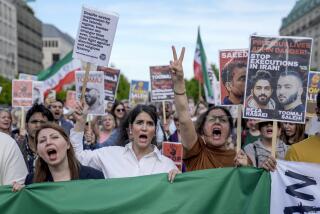6-year-old Afghan girl’s murder puts spotlight on history of discrimination and abuse in Iran
Reporting from Tehran — On the last day of her short life, Setayesh Qoreishi – a 6-year-old Afghan refugee – stepped out of her family’s home in the Tehran suburbs to buy an ice cream. She didn’t return.
Police records say she was kidnapped by a teenage Iranian neighbor who raped and stabbed the girl to death, and then attempted to dispose of her body by drowning it in a tub full of acid.
When Setayesh’s body did not dissolve, the boy began to panic. He called a neighbor, who called his parents. They alerted police, who took the boy into custody.
The brutality of the April 9 incident shocked Afghans, who have complained for years about facing violence and injustice in Iran, where millions live as refugees. And it has also fueled outrage among Iranians who have been unable to comprehend the cruelty of her killer. News reports have said he was 17 years old, though his mother has been quoted saying he is 15.
For a rare moment, Afghans in the Islamic Republic and many of their Iranian hosts were emotionally united. As the news of Setayesh’s killing spread, it shined a spotlight on the discrimination and abuse Afghan refugees say they face daily, though it goes almost unnoticed by the Iranian public.
Iranian social media embraced the hashtag “I Am Setayesh.” Hasan Khomeini – grandson of Ayatollah Ruhollah Khomeini, the founder of modern Iran – said, “Any wrongdoing against the Afghan people, who are our guests, is a matter of shame for us.”
Iranian Vice President Shahindokht Molaverdi condemned the “despicable murder” and assured the public that there would be a “punishment appropriate to the magnitude of the horrific crime.”
Yet widespread hostility in Iran against Afghan refugees has led many in both countries to doubt those words.
Jila Baniyanghoob, who attended a candlelight vigil this week near the Afghan embassy in Tehran, said Iranian police officers openly asked why those assembled felt pity for Afghans “who have committed many crimes here.”
As many as 3 million Afghans live as refugees in Iran, although only 1 million are documented, according to Human Rights Watch. The first waves of Afghans crossed over during the Soviet occupation of their country in the 1980s. While many have returned to Afghanistan, a new exodus to Iran has begun in recent months due to economic stagnation and worsening hostilities between Afghan government forces and Taliban insurgents.
Most Afghans in Iran work as hawkers, construction workers or low-skilled laborers. Human rights groups say Afghans find it difficult to find formal jobs or education, and live in perpetual fear of being arrested and deported. They are barred from holding bank accounts or cellphones in their names, and only recently were Afghans allowed to enroll their children in public primary schools.
Nearly one-third had faced some form of physical abuse, Human Rights Watch found in a 2013 survey of 100 Afghan refugees in Iran.
Untold numbers of others have been detained and even put to death inside Iran’s opaque justice system. Two years ago, amid reports that at least 3,000 Afghans were imprisoned in Iran for various alleged offenses, the Afghan government called for an end to what it said was the “continuous” practice of its citizens being executed in Iranian jails.
At demonstrations on behalf of Setayesh in several Afghan cities, Afghans said they worried that the Kabul government would not be able to apply enough pressure on Tehran to ensure justice will be served.
“Unfortunately I spent 22 years of my life in Iran, and in that time I suffered through thousands of instances of daily abuse,” said Soghra Atayi, 37, an activist who participated in a demonstration in the central province of Bamiyan.
Behista Rohan, who attended a protest this week outside the Iranian consulate in the western city of Herat, said history has shown that abuses against Afghans in Iran often go unpunished.
“This case highlights the double standard in Iran,” Rohan said. “If an Afghan is suspected of even the smallest crime they are put to death, but when one of their own commits such a heinous crime nothing happens.”
Yaghma Golrouee, a prominent Iranian poet and songwriter, addressed this prejudice in an Instagram post.
“Admit it or not, we are racist people, proud of our history and old civilizations and ancient kings,” he wrote.
The boy’s father said the crime has brought shame on his family, and that his son should face appropriate punishment. His mother, too, has expressed remorse, saying the two families were close and that she often commiserated with Setayesh’s mother about the difficulties they both faced.
Yet some in Iran already appeared to be seeking to explain the attack against Setayesh, for which police have yet to give a motive. One hardline Iranian news agency, Raja News, blamed online pornography for motivating the teenage boy to rape the girl.
Atayi, the former refugee, said she returned to Afghanistan 13 years ago following the U.S.-led military invasion, deciding that she would rather take her chances with the Taliban than endure continued ill treatment in Iran.
“I laugh when I hear that Iranis are now calling for justice,” Atayi said. “There have been hundreds of other cases of abuse and murder that went unnoticed. Now that they have been publicly shamed in their own media the Iranians are calling for justice.”
Special correspondents Mostaghim reported from Tehran and Latifi from Kabul, Afghanistan.
ALSO
9/11 attacks reemerge as a critical test of U.S.-Saudi relationship
Boat transfer in Mediterranean turns deadly; 500 migrants feared dead, U.N. says
On the frontline of Brazil’s war with Zika, a mother’s first question: ‘How big is the head?’
More to Read
Sign up for Essential California
The most important California stories and recommendations in your inbox every morning.
You may occasionally receive promotional content from the Los Angeles Times.










